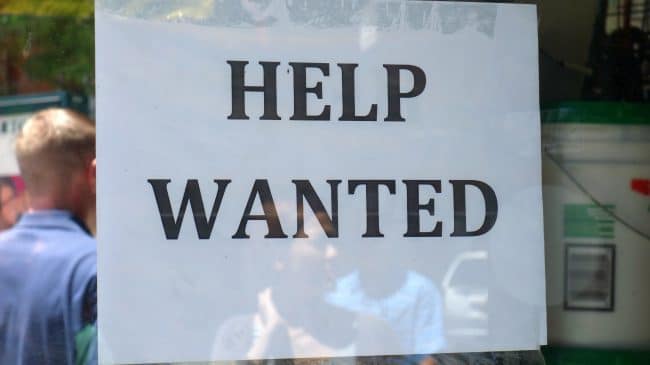With the U.S. unemployment rate below four percent, a tightening labor market is forcing employers to turn toward alternative labor pools to fill open positions.
Meanwhile, nearly one-third of the adult working-age population has a criminal record. A recent survey from Adecco USA found that firms are loosening hiring requirements and increasingly considering applicants with criminal records. The survey found, “Today, 35 percent of businesses are ‘likely’ or ‘extremely likely’ to hire temporary workers with past criminal convictions. Perhaps more than any data point in this report, this strongly supports the argument to loosen hiring requirements and represents a paradigm shift—a shift forced by the constricted labor market and an evolving sentiment towards what is considered a prohibited offense.”
Unfortunately, as companies look to loosen their hiring requirements, government-imposed hurdles to employment may hamper the reintegration of newly released prisoners, contributing to high recidivism rates and limiting opportunities for employers seeking workers.
The Adecco survey found that over half of respondents either already reduced or were planning on loosening hiring requirements for temporary workers. Over 20 percent said they stopped drug testing candidates and 16 percent stopped performing background checks. Another survey conducted by the Society for Human Resource Management found that just 26 percent of managers and 13 percent of human resources professionals were unwilling to hire workers with criminal records. Among the most frequently cited reasons for not hiring former offenders were “local, state, or federal regulations that make it impossible or very difficult to hire individuals with criminal records.”
According to the U.S. Bureau for Justice Statistics, 68.4 percent of prisoners are rearrested, or recidivated, in the first three years following release. Ample research has shown that access to gainful employment is among the most important factors for reintegrating former offenders back into society.
The recidivism rate for those employed in the first year following their release is 19.6 percent, compared to 32.4 percent for those without stable employment. Several states have implemented prison-based education and job training programs to reduce barriers to employment after release. These programs are important because prisoners often have less educational attainment than the general population. About 41 percent of the U.S. prison population lacks a high school diploma or GED, compared to just 18 percent of the general population.
Despite efforts to prepare prisoners for the job market, occupational licensing requirements in many states make it nearly impossible for former offenders to find work in many licensed occupations. For example, all 50 states require barbers, truck drivers, and pesticide applicators to hold state-issued licenses. These licensing policies can reduce employment opportunities for former prisoners through blanket prohibitions on the licensure of former offenders or through excessive requirements placed upon them, including minimum educational attainment, training and fees.
Several studies have linked occupational licensing policies to higher rates of recidivism across states. I recently co-authored a policy brief published by the James Madison Institute which found that states requiring higher training and fees had significantly higher recidivism rates. A similar report from the Center for the Study of Economic Liberty at Arizona State University found that “good moral character” provisions and licensing requirements were associated with higher rates of recidivism––even after controlling for changes in crime rates and labor market conditions.
The good news is, according to the Institute for Justice, 27 states have reformed their occupational licensing policies since 2015 to make it easier for former criminal offenders to find work.
A tightening labor market and an increasing willingness among employers to hire former offenders are promising developments that could go a long way toward reducing recidivism rates. States could leverage occupational licensing reform to lower crime rates and reduce correctional spending. Possible measures include reducing the discretion of licensing boards to deny applicants on the sole basis of their criminal records or reducing the training, education, and fees required to obtain a license.

